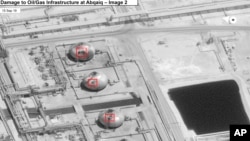Oil prices jumped sharply on Monday following an attack over the weekend on two Saudi Arabian oil-processing centers. The attacks endangered world oil supplies.
Houthi rebels in Yemen claimed responsibility for the attacks, which appear to have used drones against the Saudi Aramco oil centers. The Houthi rebels have links to Iran.
The Houthis said they used 10 drones to cause huge fires at the Abqaiq and Khurais oil centers in eastern Saudi Arabia.
The incident cut Saudi oil production by more than 50 percent. That is estimated to be about five percent of total world oil production. Saudi officials say the country will not return to normal production for weeks.
By midday on Monday, oil prices had increased by more than 10 percent on world markets, to more than $60 a barrel.
Iran considered likely cause of the attacks
Many details of the attacks remain unclear.
Iraqi news media reported that the attacks were launched from southern Iraq, where Iranian-supported militias have influence. The Iraqi government, however, denies that its territory was used to launch the attacks.
U.S. officials released satellite pictures of the damage to the Saudi oil centers. The officials say the pattern of destruction suggested that the attacks came from either Iraq or Iran – and not Yemen.
A Saudi military spokesman said an early investigation suggested that, in his words, “Iranian weapons” were used in the attacks.
U.S. President Donald Trump signaled that he was willing to launch a strike to answer the attacks. He wrote on Twitter that American forces were “locked and loaded.” In other words, they were ready to react quickly.
On Sunday, Trump tweeted, “There was reason to believe we know the culprit.” But he also said the United States was discussing the situation with Saudi Arabia.
Earlier, U.S. Secretary of State Mike Pompeo said in a tweet that “Iran has now launched an unprecedented attack on the world’s energy supply.”
Iran has denied involvement in the drone attacks. It called the accusations “maximum lies.”
Iranian general Amir Ali Hajizadeh commands the Islamic Revolutionary Guards Corps’ aerospace force. He warned that Iranian missiles could strike any U.S. base or ships within 2000 kilometers of Iran.
Iran has seized foreign oil ships in the waters off its western coast in the past four months. It also has shot down a U.S. spy drone.
Saudi officials say they are holding talks with other oil-producing countries about increasing oil production. And, Trump announced on Monday that he would permit the use of the Strategic Petroleum Reserve if needed. That is a large supply of stored oil that the U.S. holds in the event of an emergency.
I’m Mario Ritter Jr.
Mario Ritter Jr. adapted this story for VOA Learning English from VOA, AP and Reuters stories. Ashley Thompson was the editor.
We want to hear from you. Write to us in the Comments section, and visit our Facebook page.
_____________________________________________________________
Words in This Story
drone –n. a pilotless aircraft that is controlled remotely
pattern –n. something that happens in a repeated way
initial –adj. taking place at the beginning of something
culprit –n. a person who commits a crime or does something wrong
unprecedented –adj. not done or experienced before






